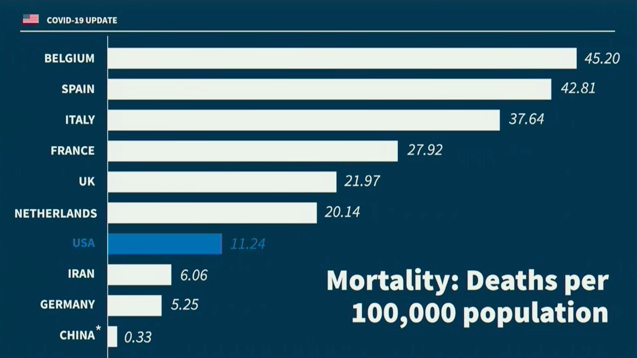Dr. Deborah Birx said the Chinese Communist Party failed to live up to its moral obligation to be transparent about the origins of the coronavirus pandemic in its country.
Birx, the response coordinator for the White House Coronavirus Task Force, made clear her doubts about the accuracy of the relatively low coronavirus fatalities reported by China, displaying a chart with a big asterisk next to the authoritarian nation’s coronavirus figures during Saturday’s press briefing.
She echoed this message on Sunday on ABC’s This Week when asked about the World Health Organization repeating China’s coronavirus claims.
“I think early on … the level of transparency and communication that you need, you have to over-communicate. You have to communicate even the small nuances,” Birx said. “When you look at the outbreak that’s been reported in China … you didn’t see that kind of doubling rate … that you see all throughout the developed countries of Europe and certainly in the United States.”
Birx said that’s why it wasn’t until the start of March that the U.S. could “fully see how contagious this virus was” and emphasized, “It’s always the first country that gets exposed to the pandemic that really has a higher moral obligation on communicating and transparency because all the other countries around the world are making decisions based on that.”
The U.S. Intelligence Community believes China misled the world about the outbreak early on and that it continues to lie about its number of coronavirus cases and death toll. Last week, it was reported that spy agencies are investigating whether the Chinese coronavirus outbreak began through transmission in a Wuhan wet market or through an accidental escape from a nearby Wuhan bio lab.
During the White House coronavirus briefing on Saturday, Birx called the data provided by Beijing “unrealistic” and emphasized the Chinese government failed to live up to its “moral obligation.”
During her discussion about case mortality rates in different countries, she said a chart showing the case fatality rate per 100,000 people in the U.S. “is about one-half to one-third” of many other Western nations, chalking this up to the quality of the U.S. healthcare system and efforts U.S. citizens took nationwide to social distance themselves and protect the most at-risk populations.
President Trump interjected, pointing to China’s position at the bottom of the chart.
“Excuse me, does anybody really believe this number?” Trump asked. Birx said Trump was right to distrust China’s figures.
“I put China on there so you could see how basically unrealistic this could be,” Birx said. “When highly developed healthcare delivery systems of the United Kingdom, and France, and Belgium, and Italy, and Spain, with extraordinary doctors and nurses and equipment have case fatality rates in the 20s up to 45, and Belgium has an extraordinarily competent healthcare system — and then China at .33.”
Birx added, “I wanted to really put it in perspective, but I also wanted you to see how great the care has been for every American hospitalized and the extraordinary work of our doctors and nurses and laboratorians on the front line.”

Trump pointed again to China’s numbers as well as to the widely-disputed numbers coming out of Iran, which has reported a fatality rate of 6.06 per 100,000 as compared to 11.24 per 100,000 in the U.S.
“Does anyone really believe that number?” Trump asked, adding, “You saw more body bags on television.”
Birx emphasized how important transparency and accurate data are for informing how other countries should prepare for a pandemic, noting, “This is why the reporting is so important.” She said that the early warnings to the U.S. about the “extraordinarily high mortality among people with preexisting conditions” came from Italy and France, not from China, even though the outbreak began in China.
“That’s why we keep coming back to how important in a pandemic, in a new disease, it’s really critical to have that level of transparency, because it changes how we work as a nation,” she said.
Birx said the warning from Europe was what allowed the U.S. to put out a mid-March alert “about vulnerable individuals and really the need to protect them.”
She said lifesaving information came amid Europe’s own coronavirus battle, and “so there is never an excuse to not share information.”
Birx stressed China especially had a special obligation to be honest early on, since the earliest coronavirus cases stemmed from Wuhan, China, in late 2019.
“When you are the first country to have an outbreak, you really have a moral obligation to the work to not only talk about it but to provide to the rest of the world that information that is critical for the rest of the world to really respond to this credibly,” Birx said. “And I want to thank our European colleagues who work so hard to get us that information, even in the midst of a pandemic.”
